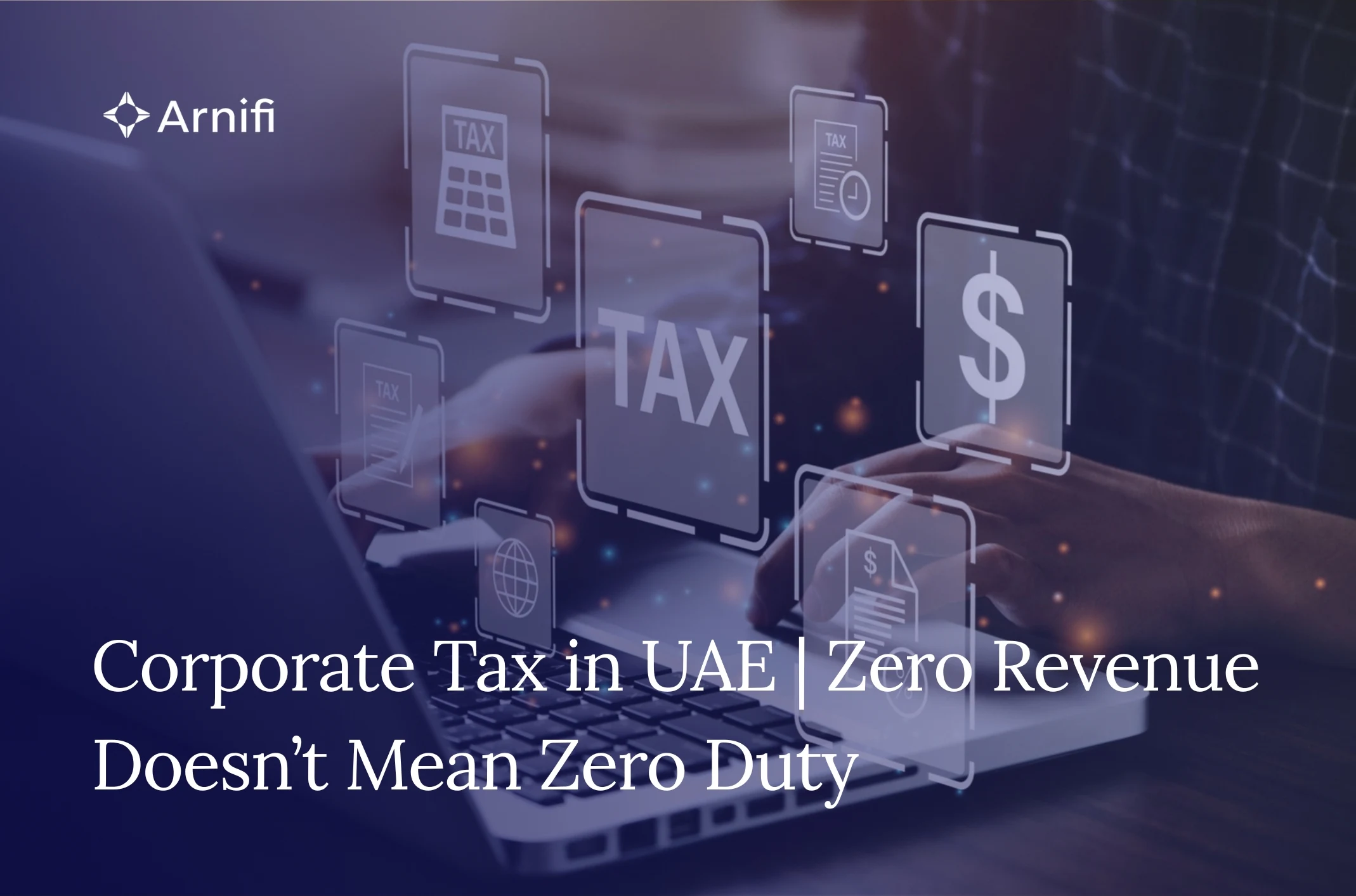How U.S. Citizens in the UAE Can Stay IRS Compliant? While Living in a Tax-Free Country – UAE
by
Shethana
Apr 15, 2025  12 MIN READ
12 MIN READ

Are you considering to start a business in Dubai? Or already residing in the UAE as an American expat? Here is what you need to know about the U.S-UAE tax laws & policies.
Introduction
Although the UAE is renowned for its 0% income tax, U.S. citizens and Green Card holders are still obligated to file U.S. taxes regardless of where they reside. The US-UAE tax relationship appears to be confusing at the start—particularly when your income is earned in a nation that has no personal tax system. But there are definitive rules, exclusions, and filing requirements you should know. In this guide, we’ll break down everything U.S. expats in the UAE need to know about filing their U.S. taxes while running a business or earning in Dubai, Abu Dhabi, or anywhere else in the Emirates.
Table of contents
- Introduction
- Who needs to file?
- Common U.S. Tax Forms for Expats
- Does the UAE Tax Your Income?
- Reporting Foreign Bank Accounts
- Penalties if U.S expats or citizens fail to file FBAR
- Filing Deadlines & Extensions
- What If You Haven’t Filed?
- How to Stay Compliant with Both IRS and UAE Authorities
- Key Takeaways
- FAQs
Who needs to file?
If you are a U.S. citizen or Green Card holder, you are required to file a U.S. tax return each year—regardless of where you reside or where your income is earned, including countries like the UAE where personal income is tax-free. The United States is one of the few countries in the world that taxes based on citizenship rather than residency. Whether you’re employed in Dubai, running a business in Abu Dhabi, or freelancing from anywhere in the Emirates, your worldwide income must be reported on your U.S. tax return.
| U.S. Citizens | Have to file a U.S. tax return annually, no matter where they reside or where their income is derived. |
Green Card Holders | Have to keep filing U.S. taxes every year, even if living permanently in the UAE. |
U.S. Citizens Operating a UAE Business | Have to report worldwide income, including any income derived from businesses registered in the UAE. |
Freelancers & Independent Contractors | Have to report all self-employment or contract income earned while abroad, including from UAE clients. |
Employees of UAE-Based Companies | Have to report salary and benefits on U.S. tax returns, regardless of whether earned in a tax-exempt state like the UAE. |
Dual Citizens (U.S. and Another Country) | Continue to have to file under U.S. taxation; there is no tax treaty between the U.S. and the UAE exempting the requirement to file. |
Minors (Children of U.S. Citizens) | Have to file a return if income (earned or unearned) exceeds IRS requirements. |
Common U.S. Tax Forms for Expats
To help with global business expansion
make sure you choose us.
Get in touch with our team to find out about our approach
Response within 24 Hours
Great, please give us a brief detail about your business.
As an American expat in the UAE, filing taxes is more than just filling out Form 1040. Depending on your income, business activities, foreign bank accounts, and other factors, you may have to file multiple other forms. Failing to do so can lead to penalties, even if you don’t owe any tax.
| Form | Purpose | Who needs to file it? |
Form 1040 | U.S. Individual Income Tax Return | All U.S. citizens and Green Card holders. |
| Form 2555 | Foreign Earned Income Exclusion (FEIE) | Expats excluding up to ~$120,000+ of foreign income. |
| Form 1116 | Foreign Tax Credit | Expats claiming credit for taxes paid to a foreign country. |
| Form 8938 | Statement of Specified Foreign Financial Assets (FATCA) | Expats with foreign assets over reporting thresholds. |
| FinCEN 114 (FBAR) | Foreign Bank Account Report | Expats with $10,000+ in foreign accounts at any time during the year. |
| Form 5471 | Information Return of U.S. Persons With Respect to Certain Foreign Corporations | U.S. citizens who own/control 10%+ of a foreign corporation. |
| Form 8858 | Information Return of U.S. Persons With Respect to Foreign Disregarded Entities | Owners of UAE businesses considered “disregarded entities”. |
| Form 8621 | Information Return for Passive Foreign Investment Company (PFIC) | U.S. persons with investments in foreign mutual funds or similar entities. |
Does the UAE Tax Your Income?
No, the UAE does not tax residents or foreign workers on personal income. If you work for a local business, own your enterprise, or are freelancing in Dubai, Abu Dhabi, or anywhere else in the Emirates, your earnings are not taxed locally by the UAE government.
But as a U.S. citizen or Green Card holder, you are still liable for U.S. taxation on all your income. That’s where provisions such as the Foreign Earned Income Exclusion (FEIE) and the Foreign Housing Exclusion come in.
Why Are FEIE and Housing Exclusion Still Relevant in a Tax-Free Country?
Although you don’t pay income tax in the UAE, the U.S IRS still wants you to file on an annual basis and report all foreign earnings. Here is how FEIE comes into effect:
- The FEIE lets you exempt up to $120,000 (for the tax year 2023) of foreign earned income, decreasing your taxable U.S. income.
- The Foreign Housing Exclusion enables you to exclude qualified housing expenses (such as rent, utilities, etc.), which can be hefty in expensive cities like Dubai.
These exclusions reduce or remove your U.S. tax liability, although you’re not taxed in the UAE.
Reporting Foreign Bank Accounts
If you are a U.S. expat living in the UAE and have a foreign financial account or several foreign financial accounts, you might need to submit two significant forms: the FBAR (FinCEN Form 114) and FATCA (Form 8938). These forms are meant to assist the IRS in monitoring offshore assets and curbing tax evasion. You need to file an FBAR if:
- You are a U.S. citizen or Green Card holder and
- The total value of all your foreign financial accounts (including bank accounts, investment accounts, and even accounts you’re a signatory on) was over $10,000 at any time during the calendar year.
You’ll need to file Form 8938 (FATCA) if your foreign financial assets are over certain amounts, based on filing status and residency:
- Single or filing separately (abroad): More than $200,000 at year-end or $300,000 at any point during the year.
- Married filing jointly (living overseas): More than $400,000 at year-end or $600,000 at any time during the year.
Important note: These limits are for expats. For U.S. citizens, the amounts are lower.
To help with global business expansion
make sure you choose us.
Get in touch with our team to find out about our approach
Response within 24 Hours
Great, please give us a brief detail about your business.
Penalties if U.S expats or citizens fail to file FBAR
Not filing either FBAR or FATCA forms can result in significant fines:
- FBAR: Fines can be up to $10,000 per non-willful failure and up to $100,000 or 50% of the account balance for willful failures.
- FATCA (Form 8938): Fines range from $10,000 up, with increasing penalties for subsequent failure.
Filing Deadlines & Extensions
As a U.S. citizen or Green Card holder residing in the UAE, it’s crucial to be aware of the following tax deadlines for the 2024 tax year (filed in 2025). Here is a tabulated version of the deadlines and payment types.
| Deadline | Description |
| Apr 15, 2025 | Tax Payment Deadline: All U.S. taxpayers, including expats, must pay any taxes owed by this date to avoid interest and penalties. |
| Jun 16, 2025 | Automatic Filing Extension: U.S. expats receive an automatic two-month extension to file their federal tax return. Note: Since June 15 falls on a Sunday in 2025, the deadline moves to Monday, June 16. |
| Oct 15, 2025 | Extended Filing Deadline: If additional time is needed, expats can file Form 4868 by June 16 to request an extension until this date. |
| Dec 15, 2025 | Special Circumstances Extension: In rare cases, expats may request a discretionary two-month extension beyond October 15 by submitting a letter to the IRS explaining the need. |
What If You Haven’t Filed?
If you’re an American citizen or Green Card holder residing in the UAE and haven’t been reporting your U.S. tax returns, don’t worry. The IRS has a special program for expats to come back into compliance without having to endure severe penalties.
How to Stay Compliant with Both IRS and UAE Authorities
Now, that is a big question! Operating a business or earning income in the UAE while maintaining U.S. tax obligations requires strategic planning and diligent recordkeeping. Here’s how you can stay compliant in both jurisdictions:
1. Understand Your U.S. Filing Obligations
- Always file on time: Use the automatic extension to June 16 (for expats) or request additional time by filing Form 4868.
- Report all income: Even if your income is tax-exempt in the UAE, report it to the IRS on your Form 1040.
- File required international forms: Ensure that FBAR (FinCEN 114), FATCA (Form 8938), Form 5471, and others (depending on your financial situation) are submitted accurately and in a timely.
2. Use Available U.S. Exclusions and Credits
- Foreign Earned Income Exclusion (Form 2555): Exclude up to ~$120,000 in foreign earned income.
- Foreign Housing Exclusion: Deduct qualified housing costs, especially beneficial in expensive UAE cities.
- Foreign Tax Credit (Form 1116): If you ever pay any tax (e.g., VAT on services, business licenses), this might offer minor offsets.
3. Maintain Clear, Organized Records
- Income records: Keep detailed records of salary, dividends, contractor income, and business revenue.
- Bank account statements: Track balances to determine FBAR/FATCA filing thresholds.
- Ownership details: If you own part of a UAE company, maintain ownership certificates, MoAs, and corporate documents.
4. Set Up Your UAE Business Properly
- Choose the correct structure: Free zone entity, mainland company, or offshore setup each has different compliance implications.
- Keep licenses up to date: Trade licenses and visas need annual renewal. Delays can affect your legal status.
- Register for VAT (if applicable): If your company exceeds the mandatory VAT threshold (AED 375,000), register with the Federal Tax Authority (FTA) and submit periodic VAT returns.
5. Be Aware of UAE Corporate Tax Rules
- The UAE has introduced a 9% corporate tax on net profits exceeding AED 375,000 for businesses.
- This doesn’t affect your income, but UAE-registered companies need to file tax returns with the UAE Ministry of Finance.
- Keep separate accounting for your UAE business and align financial year reporting with both IRS and UAE deadlines if possible.
Key Takeaways
Navigating tax compliance as a U.S. expat in the UAE can feel overwhelming, especially in a country that doesn’t tax personal income. But with the right knowledge and planning, staying compliant with both the IRS and UAE authorities is manageable. By understanding your U.S. filing obligations, taking advantage of exclusions like the FEIE, reporting foreign assets, and keeping up with UAE business and tax requirements, you can protect yourself from costly penalties and maintain peace of mind.
Whether you’re just getting started in Dubai, running a growing business, or freelancing from any Emirates, staying on top of your tax responsibilities ensures you stay focused on what matters most—building your life and success in the UAE. And when in doubt, don’t hesitate to consult professionals who understand the nuances of U.S.-UAE cross-border taxation. It’s an investment in your long-term financial health and business growth.
FAQs
- Do I need to pay taxes to both the U.S. and the UAE?
Ideally, the UAE government doesn’t collect taxes from you until you earn AED 375,000 in profit, after which a 9% corporate tax is imposed on the individual. If you’re a U.S citizen or a green card holder, then you’re liable to pay tax in U.S. - What if I’ve never filed from abroad?
You can try streamlined procedures with the help of tax filing experts to get back into compliance penalty-free.
- Are crypto wallets abroad reportable?
Yes. If they exceed the reporting thresholds and are held with a non-U.S. exchange, they could fall under FATCA or FBAR.
- What if my spouse is not a U.S. citizen?
You can still file as Married Filing Separately or consider an election to treat them as a U.S. resident if it’s tax-advantageous.
Top UAE Packages

Related Articles
Top UAE Packages



